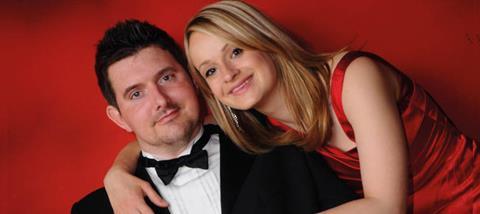
When 33-year-old dentist Andy Davies experienced a sense of neck strain and some headaches while at work in 2011, he though little of it but went to get checked by his doctor. Just six weeks later, his wife Emma found herself listening to the following medical prognosis:
‘Andy has had a major stroke in the brain stem, the control centre of the brain. This has left him with Locked-in syndrome which means his entire body has shut down, but the cognitive part of his brain is undamaged. He retains all his knowledge, understanding and intellect; his personality and character are unchanged and he knows exactly what has happened. His condition is critical and, if he survives, the Locked-in syndrome means he is unlikely to be able to live any form of independent life again, [he will be] totally dependent on others for everything. In which case Andy may not wish to go on…’
ORDINARY LIFE INTERRUPTED
Emma and Andy Davies had met at a Christian event, and married in 2008. Emma was a teacher and Andy was thriving in his career in dentistry. ‘Andy was at the top of his career, really,’ Emma says. ‘He was a dentist but also lectured in dentistry and went on to teach postgraduate dentists. He had responsibility at work and at church. We were just living life as a young married couple. Life was good.’
One ordinary day, Andy came home from work saying that he felt he had strained his neck. He had begun to have headaches. After several visits to an osteopath for manipulation of his neck, Andy went to A&E.
The couple remained unaware of any serious medical problem, but Andy had in fact begun to have a stroke. Soon he was admitted to hospital and the severity of the situation began to sink in. ‘At first we realised that he had lost the use of one side. We weren’t aware that actually it was a brain stem stroke, and this was just the beginning of it. But then the stroke took full effect. By the Tuesday he was fully locked in and had to be ventilated,’ Emma says.
THE REALISATION
‘I was aware when I was struggling to breathe,’ says Andy of the moment he realised that he was locked in, no longer able to control or use his body. He now speaks either through using a computer with a mechanised voice, or in language that Emma is able to understand. This in itself is a remarkable development – initially Andy could only blink and was unable to say anything.
On learning of Andy’s debilitating medical condition four years ago, Emma says that she ‘felt allencompassed by the Holy Spirit’.
‘I found a strength that I have never known before,’ she says. ‘I think you go into shock initially and you just cope because you have to.
Initially Emma found herself crying out to God to heal Andy in a miraculous way. ‘You go through various stages of emotion. At first we didn’t realise how severe the effects of the condition would be and I was very much believing for Andy’s healing and having faith for that. I didn’t consider that we would still be left in this situation, at that point.’
The couple say that many people, including members of their church who they didn’t previously know well, have been very supportive. ‘I can think of one person in particular…he has made a point of visiting Andy every week. He still visits every Wednesday for a number of hours and we are nearly four years on now.’
COMMITMENT THROUGH THE HARDSHIP
‘Emma was going to stick by me,’ says Andy of the assurance he has of Emma’s commitment.
‘I think we have been a rock for one another and I still feel that Andy supports me, because he is very wise and very godly, and so I am able to draw on him as much as he is able to draw on me…’ says Emma. ‘He is very physically disabled, but mentally and emotionally and spiritually, he is very strong.’
We believe that God is being glorified through our situation
But she is also honest about what they are up against daily, and says the couple ‘argue more than ever’.
‘We were married three and a half years prior to the stroke and we had one disagreement in that time. And since the stroke, we have had many. Andy’s emotions have been affected, meaning that he is emotionally labile…he is very demonstrative in his expression of frustration and laughter and sadness. All the emotions are very extreme so that can be quite difficult; but it is about learning to adapt and understand Andy’s heart behind his demonstrations of emotion.’
COURAGE AND HOPE
Andy has experienced some improvement in his condition over the four years, and has physiotherapy several times a week.
But the couple have been told by a few people that Andy has not been healed due to their lack of faith, which Emma says has been hard. They haven’t let go of their hope and prayer for Andy’s full healing, however. ‘Within the first year we did believe that Andy was going to be fully healed. We have not given up that faith or hope, but we are coming to see that perhaps it is not going to be in the way that we expect,’ she says.
‘Also we believe that God is using us in a way that he would not have been able to, had we not been in this situation.’
As they look to the future, Andy and Emma are considering adoption. Emma continues to work three days a week, and Andy has recently completed the second year of a theology degree. Having spent two years writing his story – using only his right thumb to control his computer – he would also like to do some lecturing and public speaking.
As he reflects on his situation, Andy echoes Paul’s words in 2 Corinthians 4:8: ‘I don’t think that being pressed, persecuted and struck down in this world – it just happened – but it doesn’t necessarily have to lead to despair.’
Pressed But Not Crushed by Andrew Davis with Barbara and Emma Davies (Malcolm Down Publishing) is available now
Click here to listen to the full interview on Premier Christian Radio





























